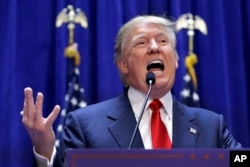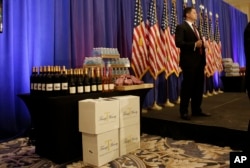The surge of brash businessman Donald Trump toward the Republican nomination for the U.S. presidency has opened a new debate in the United States about whether the country's media have fueled his unexpected political rise by not adequately assessing his life and not asking enough tough questions about his often-exaggerated claims about government policies.
President Barack Obama, a Democrat in his last year in office, joined the fray in a speech to journalists Monday. He did not name Trump but clearly had the Republican front-runner and his frequent taunts at opponents, women, Muslims and minorities in mind as he deplored the state of the campaign to choose the person who will succeed him as the 45th U.S. president.
"I know I’m not the only one who may be more than a little dismayed about what’s happening on the campaign trail right now," Obama said. "The divisive and often vulgar rhetoric that's aimed at everybody, but often is focused on the vulnerable or women or minorities. The sometimes well-intentioned but, I think, misguided attempts to shut down that speech. The violent reaction that we see, as well as the deafening silence from too many of our leaders in the coarsening of the debate. The sense that facts don’t matter, that they're not relevant. That what matters is how much attention you can generate. A sense that this is a game, as opposed to the most precious gift our founders gave us — this collective enterprise of self-government."
'Demand more'
Obama told journalists at an awards ceremony honoring an investigative reporter that "a job well done is about more than just handing someone a microphone."
"It is to probe and to question, and to dig deeper, and to demand more," Obama said. "The electorate would be better served if that happened. It would be better served if billions of dollars in free media came with serious accountability, especially when politicians issue unworkable plans or make promises they can’t keep."
Many U.S. political analysts dismissed candidate Trump, a billionaire real estate mogul and onetime reality television show host, when he announced he was running for president last June. As Trump disparaged prominent women, belittled the fact that a former Republican presidential candidate was once a prisoner of war and mocked a reporter with a permanent disability, the analysts widely predicted his campaign would soon collapse.
But it did not.
Trump's campaign to "Make America Great Again" by curbing immigration and temporarily banning Muslims from entering the U.S. touched a chord with one-third or more of Republican voters as state after state held nominating contests leading to July's national party convention, where delegates will select their presidential candidate for the November election.
Two rivals
Trump is trying to win enough delegates to assure he can claim the nomination even before the quadrennial convention, but he is not yet assured of a majority. He still faces two opponents, Texas Senator Ted Cruz, a conservative thorn in the side of Republican and Democratic leaders alike in Washington, and Ohio Governor John Kasich.
Many Republican leaders, although certainly not all of them, are trying to keep Trump from winning the nomination; many of them began supporting Cruz after their earlier favorites dropped out of the race.
Obama's thoughts about the media's role in the rise of Trump echo some of the points made by news commentators and analysts.
Nicholas Kristof of The New York Times said the media "wrongly treated Trump as a farce."
Although numerous U.S. news stories have detailed Trump's failed gambling casino ventures, his three marriages and claims that he defrauded students who paid thousands of dollars to learn about investing in real estate at a venture he called Trump University, Kristof wrote that "on the whole, we in the media empowered a demagogue and failed the country. We were lap dogs, not watchdogs."
"I personally made the mistake of regarding Trump's candidacy as a stunt," Kristof said, "scoffing at the idea that he could be the nominee. Mea culpa" — a Latin expression meaning "it was my fault."
What audiences want
Another columnist, Eugene Robinson of The Washington Post, rejected the idea that U.S. media were to blame for Trump's political ascendancy.
"The fact is that audiences have decided they need and want to know about Trump," Robinson wrote. That has led U.S. cable television news networks to give Trump endless hours of free coverage of his rallies and news conferences — so much that he has spent relatively little on paid advertising touting his candidacy.
Some networks covered intensively Trump's performance on the night he won the primary election in Florida, then convened a "news conference" at which he hawked his Trump-branded wine, mineral water and steaks, something akin to a late-night television infomercial.
Robinson of the Post said, "The news media, it seems to me, are guilty only of reporting the news, which is that a candidate who has never held elective office, and who displays neither the base of knowledge nor the temperament necessary to serve as president, is leading all comers for the Republican nomination.
"Blaming ourselves for Trump's rise," Robinson said, "is just another way to ignore the voters who have made him the favorite" for the Republican nomination.
Jonathan Allen, author of a book about Hillary Clinton, the leading Democratic presidential contender, told VOA it is hard to "not think to yourself that the media is somewhat complicit" in Trump's rise.
But Allen attributed Trump's success more to his use of social media, "which is not reporters. ... His use of Twitter, his use of Facebook, his use of the existing traditional media to get his messages out and to repeat his messages is pretty masterly, but I don't think the media are to blame."
He added, "For those who want to see reporting on various aspects of Donald Trump, it exists. It's not that no one is covering Donald Trump's business career or that no one is fact-checking him. That in fact is going on. It's what consumers choose to consume."
VOA's Jesusemen Oni contributed to this report.






